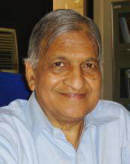
Fourth Plenary Session:
Indian Ancient Model of Economic System - Is it relevant today?
Indian Ancient Model of Economic System - Is it relevant today?
The session was chaired by Justice P.K. Shamsuddin.
Prof. Dayanand BhargavaProfessor Dayanand Bhargava presented a paper titled “ Economics of Non- possessiveness ” based on quotations from 15 works of Acharya Mahapragyaji. Professor Bhargava said that according to Acharya Mahapragyaji possessiveness means deadening of sensibilities. Non-possessiveness implies awakening of consciousness.
- When awakening leads to right attitude, then the objects remain merely the articles of utility and not the cause of any pain or pleasure and therefore, the self remains unperturbed. A person with attachment is afraid of death and cannot enjoy the quality of life. It is attachment towards the material objects, which deadens our consciousness, and our life becomes easy-going and devoid of such adventures, which awaken our consciousness.
- Non-possessiveness touches the self. Not that one should not acquire wealth; but one should not have an attachment to it. Material objects are necessary for life whereas unnecessary objects are acquired out of attachment only. Attachment is not there in the objects, it is superimposed on them by us out of infatuation. Meeting the necessities of life gives us neither pleasure nor pain, which are the creations of mind.
- All complexes are internal possession, whereas all wealth is external possession. It is the internal possession that binds and not the external possession. The ideal is neither a life of poverty nor a life of luxury. Money is the means, man is the goal and not vice versa.
- Objects belong neither to individual nor to society; they belong only to nature. Hoarding is as bad at national level as it is at individual level
- Violence is committed for the sake of wealth and power. One cannot become non-violent unless one renounces. Non-possessiveness precedes non-violence. The more the hoarding, the greater the violence. Remove possessiveness and problems will automatically dissolve into non-existence.
- Spiritualism does not provide us with objects, it eliminates the corrupt practices, which we may adopt to acquire them. Tendency to enjoy disunites, sacrifice alone unites. Nobody can wish to usurp everything for himself unless he is cruel.
- If man was merely to be only a means of development, then he becomes merely a screw in the machine.
- Religion purifies our desires and without purification of desires there cannot be honesty in financial matters. In aspiring for honesty without purification of desires we are aspiring for the impossible. No reduction of tension is possible without self-control. Increasing the necessities leads to struggle because the objects are limited and desires are unlimited. If we aim only at economic development, corruption is bound to be there. Development and self-control must go together.
- Laziness, inefficiency and paucity of infrastructure lead to poverty. True, religion also contributed towards laziness in a sense because renunciation of action, rather than renunciation of attachment, was emphasized out of proportion.
- Decentralization means equitable distribution of wealth, not by force but by a naturally acceptable order.
- Training has to be provided for renunciation, non-hoarding, honesty, and decentralization and sharing with others.
- Because of the absence of self-control there is an imbalance in the nature, as a result of exploitation of natural resources. In the absence of self-control, we plan a poor future for the coming generations.
 Dr. Ashok Bapna
Dr. Ashok Bapna